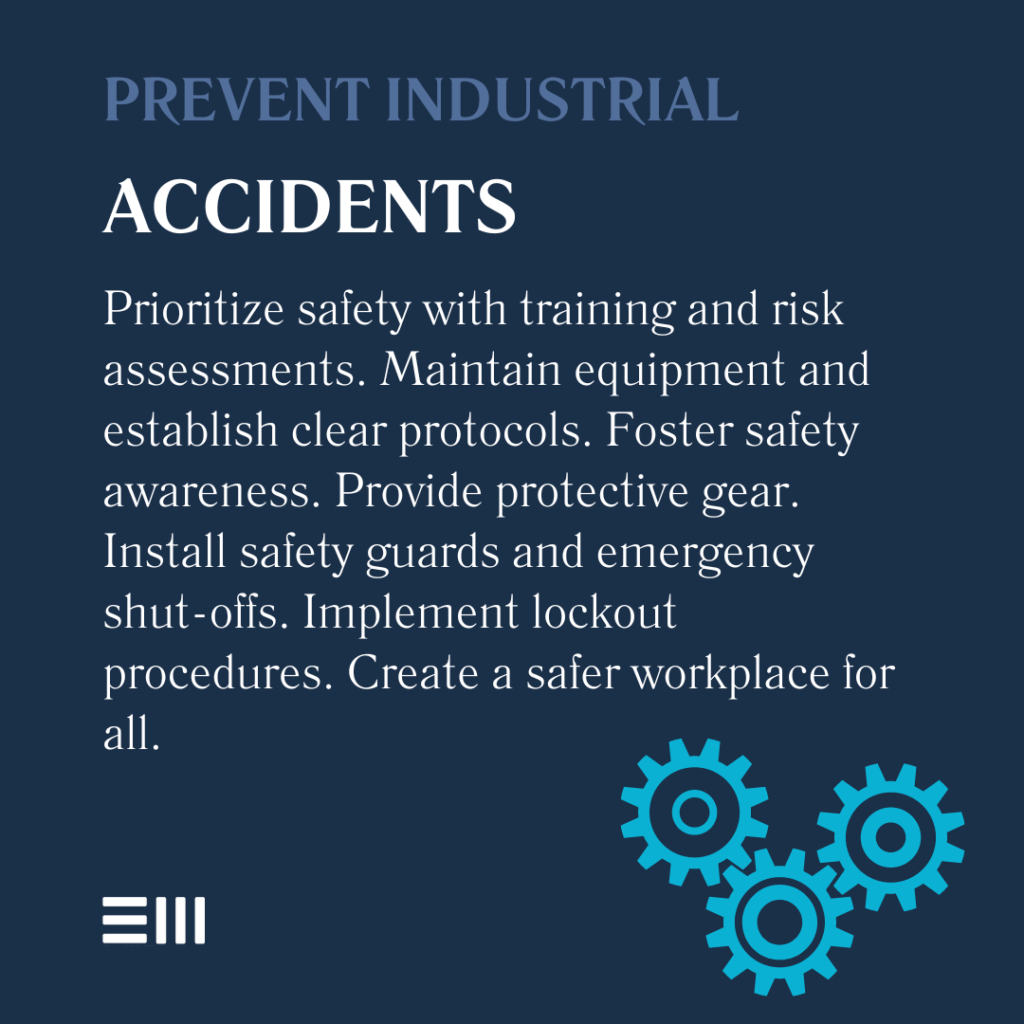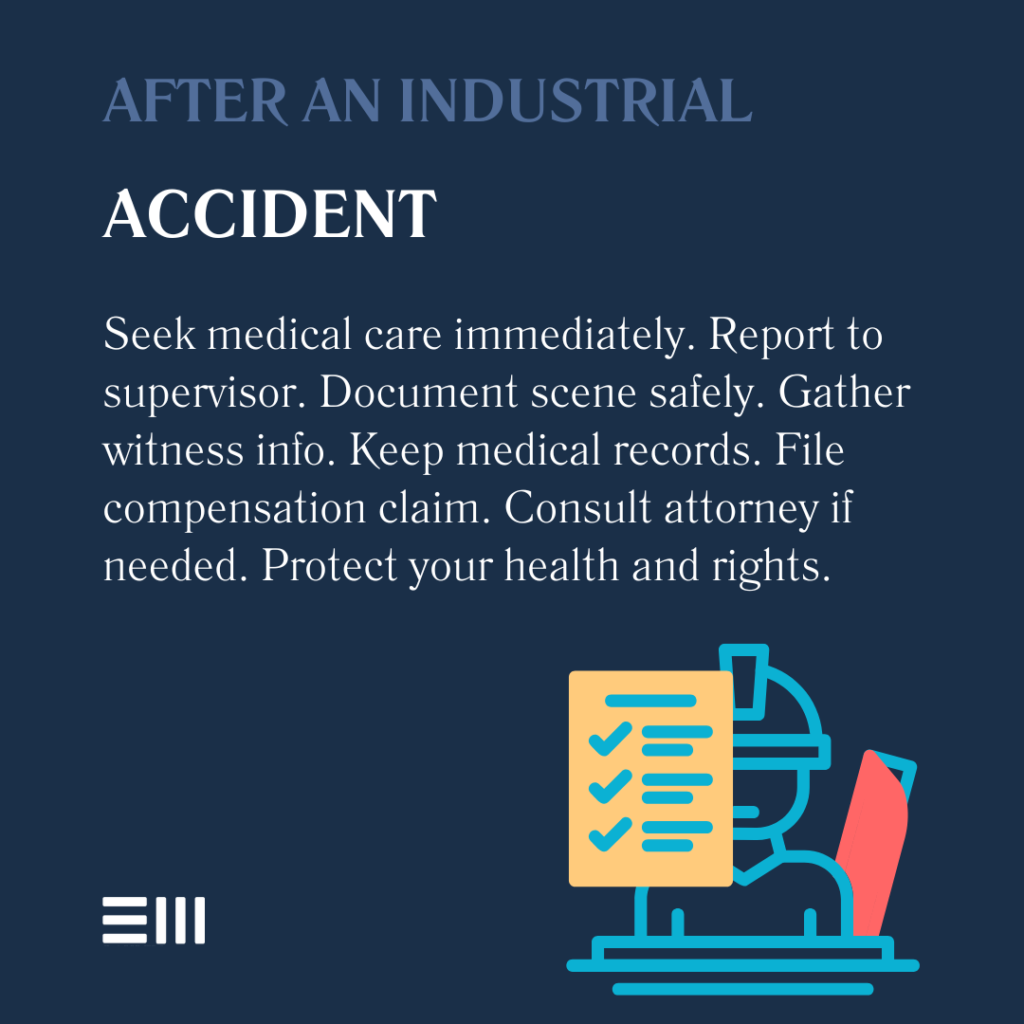
Fatalities from contact with objects and equipment rose by 4.7%, from 705 in 2021 to 738 in 2022, marking the highest number in this category since 2018. Machinery accounted for 199 of these fatalities.
This startling statistic underscores the critical importance of addressing workplace accidents, particularly those involving industrial settings and heavy machinery.
Understanding Industrial Accidents and Heavy Machinery Injuries
Industrial accidents and heavy machinery injuries encompass many incidents in manufacturing plants, construction sites, and other industrial settings.
Due to the nature of the equipment involved, these accidents often result in severe injuries or fatalities.
The potential for harm is significant, from conveyor belt entanglements to forklift accidents.
In Alabama, industries such as automotive manufacturing, aerospace, and shipbuilding contribute significantly to the state’s economy. However, these sectors also present unique safety challenges.
Understanding the types of accidents common in these industries is crucial for both prevention and proper handling of incidents when they occur.
Common Types of Industrial Accidents and Heavy Machinery Injuries
Industrial settings are rife with potential hazards.
Here are some of the most common types of accidents and injuries:
- Crushing injuries from heavy machinery;
- Falls from heights or into machinery;
- Electrocution from exposed wiring or faulty equipment;
- Amputation due to unguarded moving parts;
- Burns from chemical spills or explosions;
- Repetitive strain injuries from prolonged machine operation;
- Hearing loss from prolonged exposure to loud machinery; and
- Vision impairment from flying debris or chemical splashes.
Each accident type requires specific safety measures and protocols to prevent occurrence and minimize damage when incidents happen.
Legal Framework for Workplace Safety in Alabama
Alabama follows federal Occupational Safety and Health Administration (OSHA) standards for workplace safety.
These regulations set the minimum requirements for employers to maintain a safe work environment.
Key aspects of the legal framework include:
- Employer responsibility to provide a safe workplace;
- Employee rights to report unsafe conditions without fear of retaliation;
- Mandatory safety training for employees;
- Regular inspections and maintenance of machinery and equipment;
- Proper labeling and storage of hazardous materials; and
- Provision of appropriate personal protective equipment (PPE).
Understanding these legal requirements is essential for both employers and employees to ensure compliance and reduce the risk of accidents.
Prevention Strategies for Industrial Accidents and Heavy Machinery Injuries
Prevention is always preferable to dealing with the aftermath of an accident.
Here are some effective strategies to reduce the risk of industrial accidents and heavy machinery injuries:
- Implement comprehensive safety training programs;
- Conduct regular risk assessments and safety audits;
- Maintain and update equipment according to manufacturer specifications;
- Establish clear safety protocols and emergency procedures;
- Encourage a culture of safety awareness among employees;
- Provide appropriate PPE and ensure its proper use;
- Install safety guards and emergency shut-off mechanisms on machinery; and
- Implement lockout/tagout procedures for maintenance and repairs.
By prioritizing these prevention strategies, employers can significantly reduce the likelihood of workplace accidents and create a safer environment for all employees.

What to Do If You’ve Been Involved in an Industrial Accident or Heavy Machinery Injury
If you’ve been involved in a workplace accident involving industrial equipment or heavy machinery, take the following steps:
- Seek immediate medical attention, even for seemingly minor injuries;
- Report the accident to your supervisor or employer as soon as possible;
- Document the accident scene with photos or videos if it’s safe to do so;
- Gather contact information from any witnesses;
- Keep all medical records and documentation related to the accident;
- File a workers’ compensation claim; and
- Consider consulting with a workplace injury attorney to understand your rights.
Taking these steps can help protect your health and legal rights in the aftermath of an accident.

Workers’ Compensation for Industrial Accidents and Heavy Machinery Injuries
Workers’ compensation is a crucial resource for employees injured on the job. In Alabama, most employers are required to carry workers’ compensation insurance.
Here’s what you need to know:
- Coverage begins on the first day of employment;
- Benefits can include medical expenses, lost wages, and disability payments;
- You generally have five days to report an injury to your employer;
- Claims must typically be filed within two years of the accident; and
- You have the right to choose your own doctor after the initial treatment.
Understanding your rights under workers’ compensation can help ensure you receive the benefits you’re entitled to after a workplace accident.
Long-term Impacts of Industrial Accidents and Heavy Machinery Injuries
Industrial accidents and heavy machinery injuries can have far-reaching consequences beyond the immediate physical harm.
Long-term impacts may include:
- Chronic pain and ongoing medical treatments;
- Permanent disability or loss of bodily function;
- Psychological trauma, including PTSD;
- Loss of earning capacity;
- Strain on personal relationships; and
- Reduced quality of life.
Recognizing these potential long-term effects underscores the importance of comprehensive care and support for accident victims.
Frequently Asked Questions About Industrial Accidents and Heavy Machinery Injuries
Industrial accidents and heavy machinery injuries are complex events that often raise many questions.
Here are some of the most common inquiries we receive, along with detailed answers to help you navigate this challenging situation.
Can I Sue My Employer for a Workplace Accident in Alabama
In most cases, workers’ compensation is the exclusive remedy for workplace injuries in Alabama, meaning you cannot sue your employer directly.
However, there are exceptions:
- If your employer doesn’t have workers’ compensation insurance;
- If your employer intentionally caused your injury; and
- If a third party (not your employer or co-worker) was responsible for the accident.
In these cases, you may have grounds for a personal injury lawsuit. Consult with an attorney to understand your options based on the specifics of your situation.
What if My Accident Was Caused by Faulty Equipment?
If your accident was caused by defective machinery or equipment, you might have a product liability claim against the manufacturer or distributor.
This is separate from workers’ compensation and can be pursued in addition to your workers’ comp claim. An attorney can help investigate the cause of the accident and identify potential liable parties.
What Benefits Am I Entitled to Under Workers’ Compensation?
Workers’ compensation benefits in Alabama typically include:
- Medical expenses related to the injury;
- Temporary total disability benefits (66 2/3% of your average weekly wage);
- Permanent partial or total disability benefits; and
- Vocational rehabilitation if you can’t return to your previous job.
The specific benefits you’re eligible for will depend on the nature and severity of your injury.
Can I Choose My Own Doctor for Treatment?
In Alabama, your employer has the right to choose the initial treating physician. However, you can request a change of physician if you’re unsatisfied with the care you’re receiving.
After that, you have the right to choose your own doctor from a panel of four physicians provided by your employer or their insurance company.
What if My Claim Is Denied?
If your workers’ compensation claim is denied, you have the right to appeal. The process involves:
- Filing a complaint with the Alabama Department of Labor;
- Attending a mediation session; and
- If mediation is unsuccessful, proceeding to a hearing before a judge.
Having legal representation can be particularly helpful during the appeals process to ensure your rights are protected and your case is presented effectively.
How Can I Ensure My Workplace Is Safe From Industrial Accidents?
As an employee, you can contribute to workplace safety by:
- Following all safety protocols and procedures;
- Using provided PPE correctly;
- Reporting unsafe conditions or practices to your supervisor;
- Participating in safety training and drills;
- Staying alert and avoiding distractions while operating machinery; and
- Encouraging a culture of safety among your coworkers.
Remember, workplace safety is a shared responsibility between employers and employees.
Fight Harder, Fight Smarter. Never Settle Cheaply
Navigating the aftermath of an industrial accident or heavy machinery injury can be overwhelming. At Baxley Maniscalco, we understand the complexities of workplace accident cases in Alabama.
Our experienced team is dedicated to protecting your rights and ensuring you receive the compensation you deserve.
Don’t face this challenging time alone. Contact Baxley Maniscalco today for a free consultation.
Can't find what you're looking for? Search our site below.










